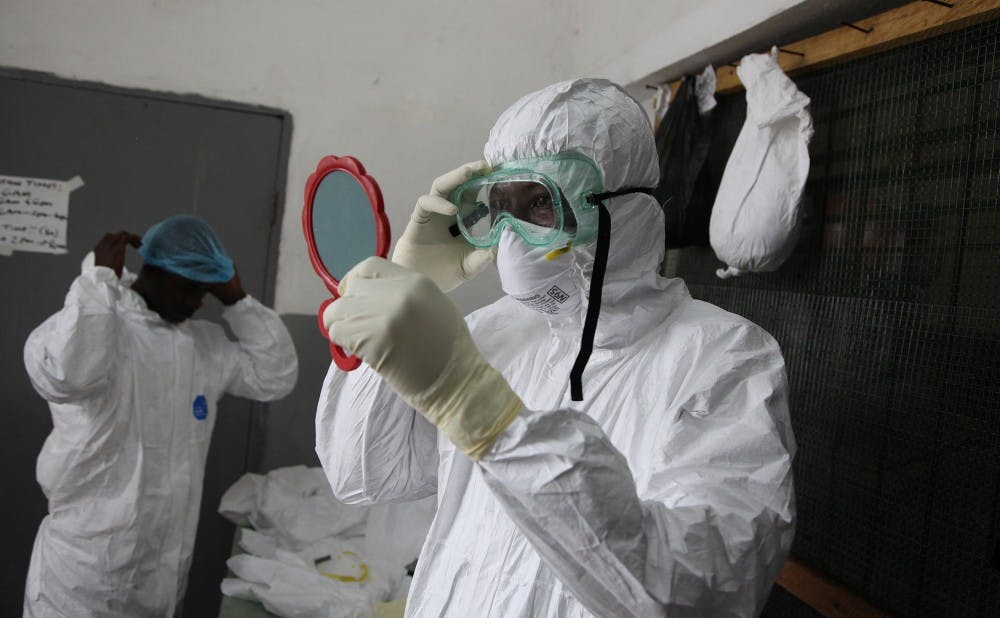As fear of the Ebola virus spreads, administrators at Duke are taking precautions in case the virus hits locally.
Duke Medicine confirmed a false Ebola scare last Thursday and continues to make preparations to handle the possibility of an Ebola patient. Meanwhile, the University is taking separate measures to protect members of the Duke community—particularly travel restrictions and regulations. Travel restrictions to West Africa have been expanded, and Duke is monitoring the activity of students, faculty and staff in the region, said Vice President for Administration Kyle Cavanaugh.
"Ever since the Ebola outbreak in West Africa, we have been monitoring the situation closely with infectious disease experts in Duke Medicine," Cavanaugh said.

A baby who had recently been in West Africa was brought to Duke Regional Hospital with a fever late Wednesday night, spokespeople confirmed Thursday. The case proved to be false, however.
"The false alarm was confirmed quickly and there was never a disruption in services within the hospital and Duke Regional continues to operate per usual," Duke University Health System said in a statement.
Newly established protocols require all patients entering Duke University Health System to be screened for possible risk of exposure to Ebola. In addition to creating its own regulations, Duke Medicine is working to help the University develop policies, Cavanaugh said.
"Duke Medicine is also coordinating closely with Duke’s Student Health Center and Employee and Occupational Health to ensure the safety of Duke student, staff and faculty members," he added.
Cavanaugh noted that the University has been determining strategies in collaboration with the Centers for Disease Control and Prevention, the North Carolina State Department of Health and Human Services and leaders from Duke’s Division of Infectious Diseases and Emergency Preparedness.
Duke has enforced full country travel restrictions on four countries for undergraduate students so far—Liberia, Guinea, Nigeria and Sierra Leone. Restrictions were in place for Sierra Leone prior to the outbreak for security reasons, but restrictions were placed on Liberia and Guinea in August. The restrictions on Nigeria came later this fall.
"[The restrictions] apply to undergraduates potentially traveling on Duke programs," Cavanaugh wrote in an email Sunday. "Coordination and oversight for this effort is coordinated though the International Travel Oversight Committee."
For the graduate and professional student community—as well as staff and faculty members—traveling to these countries is strongly discouraged by the administration. Cavanaugh said that the administration is still discussing an overall approach to travel policies for these areas.
Further precautions taken by the University include monitoring student, faculty and staff locations across the world, Cavanaugh noted. Members of the Duke community who have recently traveled to West Africa are responsible for contacting Employee Occupational Health and Wellness or the Student Health Center before coming back to Durham. Prior to returning to campus, they must consult with medical personnel.
"It is critical that we will be able to identify the location of individuals traveling internationally so that we can provide support as conditions warrant," he said.
Although many universities have enacted similar restrictions, not all of Duke's peers are doing so. Yale University, for instance, has maintained that it will leave travel to West Africa open—even after a student who traveled to Liberia for research was hospitalized in a false alarm for the virus.
"As an academic institution with a research and teaching mission and a long tradition of service, it is important for our clinicians and investigators to be able to go where they can put their training and expertise to the highest, best use," Yale President Peter Salovey said in a written statement. "Some members of our community with special expertise may be called on to engage directly in order to advance knowledge and understanding, to treat the sick or to tend to those who are displaced or suffering."
Get The Chronicle straight to your inbox
Signup for our weekly newsletter. Cancel at any time.

